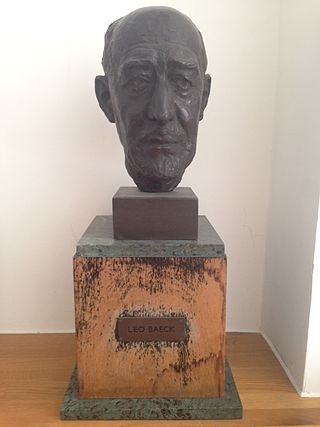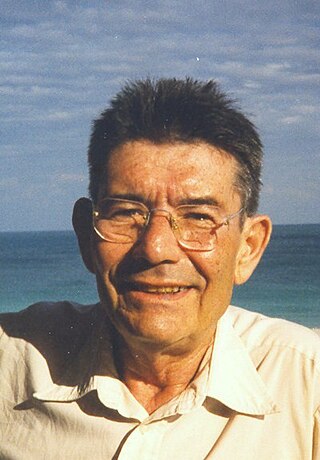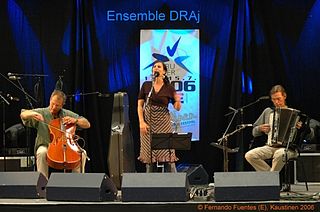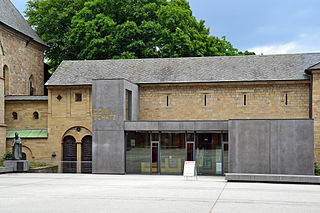
The Ruhr, also referred to as the Ruhr area, sometimes Ruhr district, Ruhr region, or Ruhr valley, is a polycentric urban area in North Rhine-Westphalia, Germany. With a population density of 2,800/km2 and a population of over 5 million (2017), it is the largest urban area in Germany. It consists of several large cities bordered by the rivers Ruhr to the south, Rhine to the west, and Lippe to the north. In the southwest it borders the Bergisches Land. It is considered part of the larger Rhine-Ruhr metropolitan region of more than 10 million people, which is the third largest in Western Europe, behind only London and Paris.

Brundibár is a children's opera by Jewish Czech composer Hans Krása with a libretto by Adolf Hoffmeister, made most famous by performances by the children of Theresienstadt concentration camp (Terezín) in occupied Czechoslovakia. The name comes from a Czech colloquialism for a bumblebee.

Leo Baeck was a 20th-century German rabbi, scholar, and theologian. He served as leader of Reform Judaism in his native country and internationally, and later represented all German Jews during the Nazi era. After the Second World War, he settled in London, in the United Kingdom, where he served as the chairman of the World Union for Progressive Judaism. In 1955, the Leo Baeck Institute for the study of the history and culture of German-speaking Jewry was established, and Baeck was its first international president. The Leo Baeck Medal has been awarded since 1978 to those who have helped preserve the spirit of German-speaking Jewry in culture, academia, politics, and philanthropy.

Kurt Gerron was a German Jewish actor and film director. He and his wife, Olga, were murdered in the Holocaust.
Witthüser & Westrupp was a German singer-songwriter duo from Essen. The guitarist Bernd Witthüser (1944-2017) and the multi-instrumentalist Walter Westrupp had their roots in the folk and protest song movement, and their joint titles initially had macabre, later predominantly psychedelic elements. The band was formed in June 1969 as "W&W's pop cabaret", singing German texts in a special way. In 1970 the name changed to "Witthüser & Westrupp". Their music was attributed to the genre of psychedelic folk and later to krautrock. Their best-known album became the 1971 concept album Der Jesuspilz, in which an undefined substance becomes a symbol of the divine. The duo existed from 1969 to 1973. Later, Bernd Witthüser lived in Murci (Italy) until his death, while he was working as the street musician Bärnelli in Europe. Walter Westrupp is still living in Germany and is the frontman of the skiffle and jug band Walter h.c. Meier Pumpe.

Theodor Dannecker was a German SS-captain, a key aide to Adolf Eichmann in the deportation of Jews during World War II.

Herbert Thomas Mandl was a Czechoslovak-German-Jewish author, concert violinist, professor of music, philosopher, inventor and lecturer. He authored novels, stories and dramas that are inspired by the extraordinary events of his life.
Hans Günther Adler was a Czech-English German-language poet and novelist, scholar, and Holocaust survivor.

Ensemble DRAj is a German Klezmer group dedicated to arranging and presenting songs in Yiddish. The term “draj” is the Yiddish translation of the German word “drei”.
Lichtburg has been a popular name for cinemas in Germany. Those in Berlin, Essen and Düsseldorf have been particularly famous; the Lichtburg in Oberhausen is the site of the International Short Film Festival Oberhausen, and Quernheim is the smallest municipality in Germany with a cinema, also called Lichtburg.

The Ghetto Swingers were a jazz band organised in the Nazi concentration camp Theresienstadt.

The Essen Cathedral Treasury is one of the most significant collections of religious artworks in Germany. A great number of items of treasure are accessible to the public in the treasury chamber of Essen Minster. The cathedral chapter manages the treasury chamber, not as a museum as in some places, but as the place in which liturgical implements and objects are kept, which continued to be used to this day in the service of God, so far as their conservation requirements allow.

The Cross of Otto and Mathilde, Otto-Mathilda Cross, or First Cross of Mathilde is a medieval crux gemmata processional cross in the Essen Cathedral Treasury. It was created in the late tenth century and was used on high holidays until recently. It is named after the two persons who appear on the enamel plaque below Christ: Otto I, Duke of Swabia and Bavaria and his sister, Mathilde, the abbess of the Essen Abbey. They were grandchildren of the emperor Otto I and favourites of their uncle, Otto II. The cross is one of the items which demonstrate the very close relationship between the Liudolfing royal house and Essen Abbey. Mathilde became Abbess of Essen in 973 and her brother died in 982, so the cross is assumed to have been made between those dates, or a year or two later if it had a memorial function for Otto. Like other objects in Essen made under the patronage of Mathilde, the location of the goldsmith's workshop is uncertain, but as well as Essen itself, Cologne has often been suggested, and the enamel plaque may have been made separately in Trier.

Benjamin Ziemann is a German historian who lectures at the University of Sheffield. Since 2011, he has been Professor of Modern German History at the Department of History, University of Sheffield.

Gerhard Hirschfeld is a German historian and author. From 1989 to 2011, he was director of the Stuttgart-based Bibliothek für Zeitgeschichte / Library of Contemporary History, and has been a professor at the Institute of History of the University of Stuttgart since 1997. In 2016 he also became a visiting professor at the Institute for International Studies, University of Wuhan/China.
Thomas Krauth is a German business man, arts dealer and former musical producer.

Jürgen Reulecke is a German historian and emeritus professor.
Wilhelm Simon Guttmann was a German writer, political commentator, and managing director of picture agencies and who inspired significant photographers including Robert Capa, Maria Eisner, Felix Mann and Kurt Hutton.

The Seven-Branched Candelabrum is a large candlestand from the Essen Cathedral Treasury. Today, it stands on the ground floor of the Westwork of Essen Cathedral. The lampstand, which dates to around the year 1000, is a significant bronze artwork of the early Middle Ages and the oldest preserved seven-armed church candelabrum.














